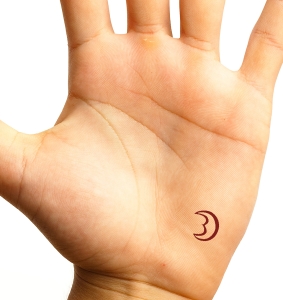By Vedic Astro-Palmist, Guylaine Vallée
There is a great deal of truth in the old adage: Seeing is believing. Unfortunately, there is a great deal of untruth in it as well. When our Luna is not balanced, the information we are receiving through our sense organs can be skewed, misleading and even harmful.
Perhaps a good illustration of the sensory information we receive through an imbalanced Luna is a stroll through an amusement park House of Mirrors. In one mirror, we perceive ourselves as squat and fat, in another we are tall and toothpick thin, in a third we look like a hot-air balloon. The images are grotesque, but because we are aware of being in an amusement park, we know the information our eyes are receiving is faulty and we can laugh at what we are seeing. But when our Luna is off, we don’t need to be in an amusement park to receive distorted images of ourselves.
How often have we looked at own reflection and seen something that really wasn’t there, or projected an image onto ourselves that was untrue? We may have the loveliest face on the planet, but our mind obsesses on the tiny pimple on our chin until that pimple is all we see, and all we believe the world sees when we are looked at.
But what is the Moon?
 The Mount of Luna is perhaps the most important of the hand’s ten mounts—some say it is the most important feature of the entire palm. That is because Luna governs our five senses of perception—smell, taste, sight, touch and hearing—which means that Luna pretty much governs the way we see, feel, experience and interpret everything we encounter in the world. In short, Luna is responsible for our thoughts; it affects every single aspect of our lives—from our moods and emotions to our relationships, our self-image and our mental health. And given the overwhelming amount of recent mind-body research illustrating the enormous impact our thoughts and emotions have on our bodies, Luna also plays a major role in our physical health and well-being.
The Mount of Luna is perhaps the most important of the hand’s ten mounts—some say it is the most important feature of the entire palm. That is because Luna governs our five senses of perception—smell, taste, sight, touch and hearing—which means that Luna pretty much governs the way we see, feel, experience and interpret everything we encounter in the world. In short, Luna is responsible for our thoughts; it affects every single aspect of our lives—from our moods and emotions to our relationships, our self-image and our mental health. And given the overwhelming amount of recent mind-body research illustrating the enormous impact our thoughts and emotions have on our bodies, Luna also plays a major role in our physical health and well-being.
Our mind can be bombarded by so much sensory data that we become preoccupied with the physical world. Instead of feeling the joy of a beautiful summer day, we choose instead to focus on our bad hair day . . . or the unsightly pimple on our chin.
Even with our eyes closed during prayer or meditation, we are still assaulted by thoughts and images—even when we try to block them out. If we do not train our mind to connect to our higher levels of consciousness, we will be forever at the mercy of our sensory perception. This condition can create an ever-escalating series of emotional highs and lows, which will disturb our happiness, complicate our lives and undermine our spiritual progress. Instead of concentrating on achieving our goals or pursuing our dreams, we waste time thinking of ways to get even with the rude motorist who cut us off; instead of being present with our child at a hockey game, we are wondering if our spouse is texting his old flame, instead of focusing on finishing our work assignments we fret away the hours wondering if our office mates are gossiping about us, and instead of meditating to calm our nerves we dwell upon the perceived snub by a friend.
 These errant emotional thoughts are powerful disruptions that separate us from ourselves, from our purpose in life, and from those who rely on us. When we mentally wander off in this fashion, it can be said that we’ve “gone fishing”. This old English idiom refers to someone who has become completely unaware of their surroundings and has checked out from reality. Our best friend might be describing the birth of their first child to us, but they might as well save their breath—we may look like we are listening, but we are not hearing a word they say. We might show up for work every day, do our chores at home, even go out for nice dinners or to shows, but later we will have a hard time describing what we have done because we were AWOL from our own lives.
These errant emotional thoughts are powerful disruptions that separate us from ourselves, from our purpose in life, and from those who rely on us. When we mentally wander off in this fashion, it can be said that we’ve “gone fishing”. This old English idiom refers to someone who has become completely unaware of their surroundings and has checked out from reality. Our best friend might be describing the birth of their first child to us, but they might as well save their breath—we may look like we are listening, but we are not hearing a word they say. We might show up for work every day, do our chores at home, even go out for nice dinners or to shows, but later we will have a hard time describing what we have done because we were AWOL from our own lives.
Even if, overall, we are a “glass half full” type of person, if our Luna is imbalanced—when we become too caught up in our thoughts or when our perception is false or faulty—that glass can suddenly appear to be half empty. Luna is responsible for feelings of sensitivity, receptivity and empathy. But when our perception goes haywire, we can easily withdraw into ourselves and witness the best parts of our Luna begin to falter and fail. We can come to view ourselves as being undeserving, unattractive, untalented and unworthy. And if we are overly focused on the external, we run the risk of disconnecting from our inner self and becoming subjective or even irrational, ruining perfectly good jobs, relationships or our future by failing to see correctly.
Sometimes, if we are habituated to emotional drama and in need of great levels of stimulation, we can develop an addiction to substances, some natural like adrenaline, others that are manufactured like drugs and alcohol, that flood into our bloodstream when our emotions are in a state of turmoil and distress. To fuel our addiction, we may attract abusive relationships, deliberately injure ourselves or recklessly put ourselves in situations that are illegal or dangerous. All this drama and chaos can prevent us from connecting with our inner peace and joy.
At the Birla Center we’ve found one of the easiest and most effective ways to transform inner turmoil into creativity and joy is ensuring our Mount of Moon is strong and balanced. In Vedic palmistry the Mount of Moon, or Luna, corresponds to our mind and emotions—it rules our power of perception and shapes the way we view ourselves and the world around us. Indeed, the condition our Luna is in can make our life a heaven or a hell. So, we better make sure we are using our Moon energy properly—our success and happiness depend on it!
Brand-New Course: Luna and The Power of Perception
Join astro-palmist Guylaine Vallée this fall as she guides you through her brand new, life-transforming course: Luna and The Power of Perception. This life-changing program teaches you everything you need to know about creating peace of mind, focusing your creative energies positively, using your imagination to create health and happiness, and to express your feelings freely from the heart.



